Korean idioms are an essential part of daily conversations.
Idioms are expressions that have a different meaning than what the individual phrase suggests. They’re unique to a language or culture and are often used in everyday conversation.
In this post, we’ll teach you all about idioms and their Korean version to help you brush up on your knowledge of these expressions if you’re planning on communicating with native Korean speakers.
Contents
- 1 “Idioms” in Korean
- 2 Korean Idioms
- 2.1 1. 서당 개 삼 년이면 풍월을 읊는다 (seodang gae sam nyeonimyeon pungworeul eumneunda)
- 2.2 2. 김칫국부터 마시지 말라 (gimchitgukbuteo masiji malla)
- 2.3 3. 개천에서 용 난다 (gaecheoneseo yong nanda)
- 2.4 4. 구르는 돌에는 이끼가 끼지 않는다 (gureuneun doreneun ikkiga kkiji anneunda)
- 2.5 5. 빈 수레가 요란하다 (bin surega yoranhada)
- 2.6 6. 똥 묻은 개가 겨 묻은 개 나무란다 (ttong mudeun gaega gyeo mudeun gae namuranda)
- 2.7 7. 시작이 반이다 (sijagi banida)
- 2.8 8. 금강산도 식후경이다 (geumgangsando sikugyeongida)
- 2.9 9. 웃는 얼굴에 침 뱉으랴 (unneun eolgure chim baeteurya)
- 2.10 10. 찬물도 위아래가 있다 (chanmuldo wiaraega itda)
- 2.11 11. 가려운 곳을 긁어 주다 (garyeoun goseul geulgeo juda)
- 2.12 12. 돌다리도 두들겨 보고 건너라 (doldarido dudeulgyeo bogo geonneora)
- 2.13 13. 호랑이에게 물려가도 정신만 차리면 산다 (horangiege mullyeogado jeongsinman charimyeon sanda)
- 2.14 14. 고양이에게 생선을 맡기다 (goyangiege saengseoneul matgida)
- 2.15 15. 콩 심은 데 콩 나고 팥 심은 데 팥 난다 (kong simeun de kong nago pat simeun de pat nanda)
- 2.16 16. 싼 게 비지떡이다 (ssan ge bijitteogida)
- 2.17 17. 배움에는 왕도가 없다 (baeumeneun wangdoga eopda)
- 2.18 18. 장구를 쳐야 춤을 추지 (janggureul chyeoya chumeul chuji)
- 2.19 19. 고생 끝에 낙이 온다 (gosaeng kkeute nagi onda)
- 2.20 20. 말 한마디에 천냥 빚을 갚는다 (mal hanmadie cheonnyang bijeul gamneunda)
- 2.21 21. 지렁이도 밟으면 꿈틀한다 (jireongido balbeumyeon kkumteulhanda)
- 2.22 22. 하늘이 무너져도 솟아날 구멍이 있다 (haneuri muneojyeodo sosanal gumeongi itda)
- 2.23 23. 개똥도 약에 쓰려면 없다 (gaettongdo yage sseuryeomyeon eopda)
- 2.24 24. 아니 땐 굴뚝에 연기 날까 (ani ttaen gulttuge yeongi nalkka)
- 2.25 25. 올라간 것은 반드시 내려와야 한다 (ollagan geoseun bandeusi naeryeowaya handa)
- 2.26 26. 소 잃고 외양간 고치기 (so ilko oeyanggan gochigi)
- 3 What to learn next?
- 4 Wrap Up
“Idioms” in Korean
The word for “idioms” in Korean is 숙어 (sugeo). Another term that you can use is 관용구 (gwanyonggu).
Now, let’s head on to the different Korean idioms below.
Korean Idioms
Below, we’ll teach you what each Korean idiom means, which should level up your vocabulary.
1. 서당 개 삼 년이면 풍월을 읊는다 (seodang gae sam nyeonimyeon pungworeul eumneunda)
Listen here:
Meaning: You automatically learn what you expose yourself to
Literal Translation: A school dog recites a poem after three years
2. 김칫국부터 마시지 말라 (gimchitgukbuteo masiji malla)
Listen here:
Meaning: Don’t count your chickens before they’re hatched
Literal Translation: Don’t drink the kimchi soup first
When to use it: Let’s say your friend is buying something, such as a new car. She is deciding between a standard car and a more expensive car. If she is counting on a raise at work to pay for the more expensive car, you can use this Korean idiom.
The meaning is that you should wait until what you expect to happen actually happens. Kimchi soup is eaten after food to improve digestion. Therefore, you should wait for your main meal to come before eating the soup.
3. 개천에서 용 난다 (gaecheoneseo yong nanda)
Listen here:
Meaning: From rags to riches
Literal Translation: From the stream, a dragon rises
4. 구르는 돌에는 이끼가 끼지 않는다 (gureuneun doreneun ikkiga kkiji anneunda)
Listen here:
Meaning: A rolling stone gathers no moss
Literal Translation: A rolling stone gathers no moss
5. 빈 수레가 요란하다 (bin surega yoranhada)
Listen here:
Meaning: Empty vessels make the most sound
Literal Translation: An empty cart rattles loudly
6. 똥 묻은 개가 겨 묻은 개 나무란다 (ttong mudeun gaega gyeo mudeun gae namuranda)
Listen here:
Meaning: The pot calling the kettle black
Literal Translation: The dog covered with dung scolds the dog with the chaff.
7. 시작이 반이다 (sijagi banida)
Listen here:
Meaning: Well begun is half done.
Literal Translation: The start is the half
When to use it: This is a popular Korean idiom. It means that just getting started is something significant, or you’re already towards half the battle.
This is one of the idioms you could use with a friend who is starting something new but is unsure of the direction. For example, maybe your friend is learning Korean, and you want to applaud her for doing so. Use these simple words to give your friend some support!
8. 금강산도 식후경이다 (geumgangsando sikugyeongida)
Listen here:
Meaning: A loaf of bread is better than the song of many birds
Literal Translation: First eat, then see Geumgang Mountain
9. 웃는 얼굴에 침 뱉으랴 (unneun eolgure chim baeteurya)
Listen here:
Meaning: It is hard to get angry at a smiling face
Literal Translation: You can’t spit in a smiling face
10. 찬물도 위아래가 있다 (chanmuldo wiaraega itda)
Listen here:
Meaning: There is a proper order for everything
Literal Translation: Even cold water has high and low
11. 가려운 곳을 긁어 주다 (garyeoun goseul geulgeo juda)
Listen here:
Meaning: You scratch where it itches
Literal Translation: Give a scratch to the itchy place
When to use it: This Korean idiom can be used when someone does something to satisfy your needs without asking for it. For example, imagine you just got done with a basketball game. You are very thirsty, and without asking, your friend gives you an ice-cold Powerade. 가려운 곳을 긁어 주다 (garyeoun goseul geulgeo juda)!
Keep Korean phrases like this handy when you get something unexpected.
12. 돌다리도 두들겨 보고 건너라 (doldarido dudeulgyeo bogo geonneora)
Listen here:
Meaning: Look before you leap
Literal Translation: First knock on the stone bridge before crossing
13. 호랑이에게 물려가도 정신만 차리면 산다 (horangiege mullyeogado jeongsinman charimyeon sanda)
Listen here:
Meaning: Keep your cool even in the face of despair
Literal Translation:Even though you are bitten by a tiger, you will live if you come to your senses
14. 고양이에게 생선을 맡기다 (goyangiege saengseoneul matgida)
Listen here:
Meaning: Let the fox guard the sheep
Literal Translation: Entrust the fish to the cat
15. 콩 심은 데 콩 나고 팥 심은 데 팥 난다 (kong simeun de kong nago pat simeun de pat nanda)
Listen here:
Meaning: You reap what you sow
Literal Translation: A bean grows where you plant a bean, and a red bean grows where you plant a red bean
16. 싼 게 비지떡이다 (ssan ge bijitteogida)
Listen here:
Meaning: If you buy cheap, you waste your money
Literal Translation: Cheap things are dreg cakes (rice cakes made from remains of bean curd)
17. 배움에는 왕도가 없다 (baeumeneun wangdoga eopda)
Listen here:
Meaning: There is no shortcut to learning
Literal Translation: There is no shortcut to learning
18. 장구를 쳐야 춤을 추지 (janggureul chyeoya chumeul chuji)
Listen here:
Meaning: Help is needed at times
Literal Translation: You can only dance when the jangu (drum) is played
19. 고생 끝에 낙이 온다 (gosaeng kkeute nagi onda)
Listen here:
Meaning: No pain, no gain
Literal Translation: Delight comes at the end of difficulty
When to use it: You can use this idiom for someone going through a difficult time while working towards something worthwhile. It means that at the end of hardships comes happiness.
You could use this idiom if your sister is studying to take a test to get into medical school. Let’s say she is halfway through the test prep course, and she wants to give up because it’s so difficult. You encourage her to keep going by saying, “고생 끝에 낙이 온다 (gosaeng kkeute nagi onda)!”
The English translation of the words is similar to what the idiom actually means.
20. 말 한마디에 천냥 빚을 갚는다 (mal hanmadie cheonnyang bijeul gamneunda)
Listen here:
Meaning: A soft answer turns away wrath
Literal Translation: One word pays back a debt of a thousand nyang
21. 지렁이도 밟으면 꿈틀한다 (jireongido balbeumyeon kkumteulhanda)
Listen here:
Meaning: Even gentle people can lose their tempers
Literal Translation: Even a worm will wiggle if you step on it
22. 하늘이 무너져도 솟아날 구멍이 있다 (haneuri muneojyeodo sosanal gumeongi itda)
Listen here:
Meaning: There is a way out of every situation
Literal Translation: Even if the sky collapses, there is a hole to escape out of
23. 개똥도 약에 쓰려면 없다 (gaettongdo yage sseuryeomyeon eopda)
Listen here:
Meaning: Things are never where you want them
Literal Translation: When you want to find even dog dung to use as medicine, you can’t find it
24. 아니 땐 굴뚝에 연기 날까 (ani ttaen gulttuge yeongi nalkka)
Listen here:
Meaning: Where there’s smoke, there’s fire
Literal Translation: Will smoke come out of a chimney if there is no fire?
25. 올라간 것은 반드시 내려와야 한다 (ollagan geoseun bandeusi naeryeowaya handa)
Listen here:
Meaning: What goes up must come down
Literal Translation: What goes up must come down
26. 소 잃고 외양간 고치기 (so ilko oeyanggan gochigi)
Listen here:
Meaning: Hindsight is 20/20
Literal Translation: Fix the barn after losing the cow
What to learn next?
If you enjoyed what you’ve learned so far, here are other articles related to Korean idioms to help you improve your Korean language skills.
Korean Proverbs – https://www.90daykorean.com/korean-proverbs-sayings/
Korean Quotes – https://www.90daykorean.com/korean-quotes/
Korean Sayings – https://www.90daykorean.com/korean-sayings/
Wrap Up
And that’s it for Korean idiomatic expressions! Knowing each Korean expression can add depth and personality to your speech. But if you’re unfamiliar with the language or Korean culture, it can be quite tricky to use, so make sure you’re well-equipped!
We hope that by learning each Korean idiom above along with their literal meaning, you have learned more about Korean idioms and can now communicate better with native Korean speakers. Til next time!



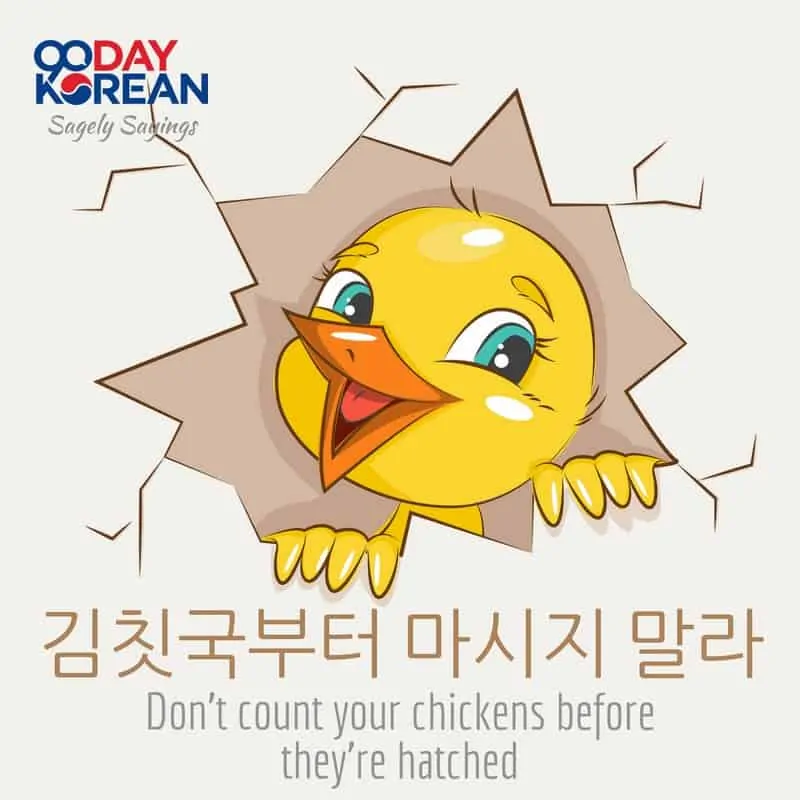
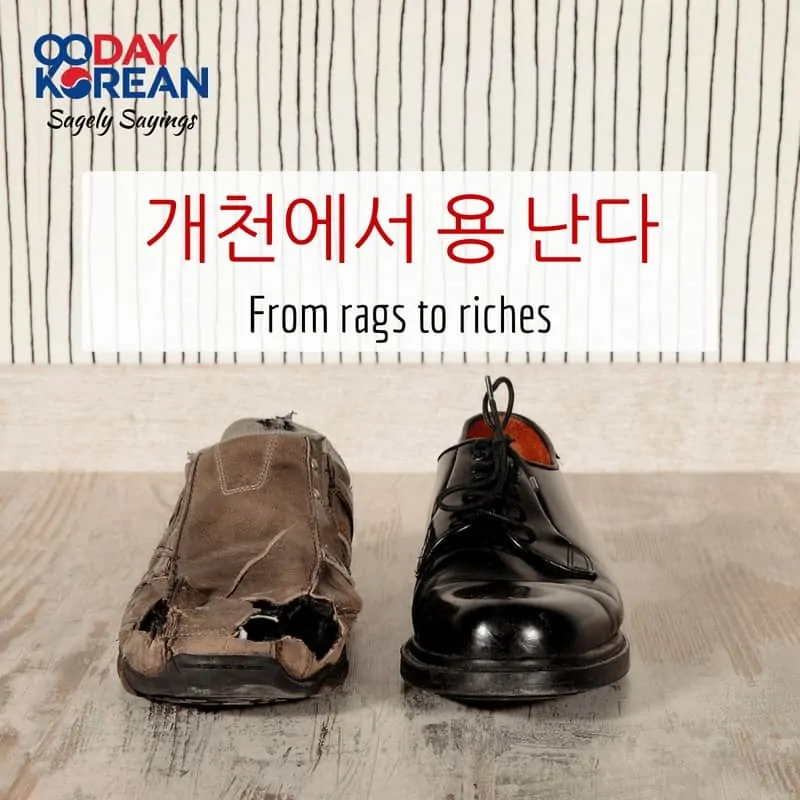
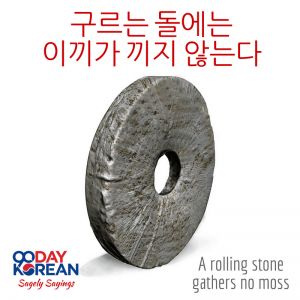

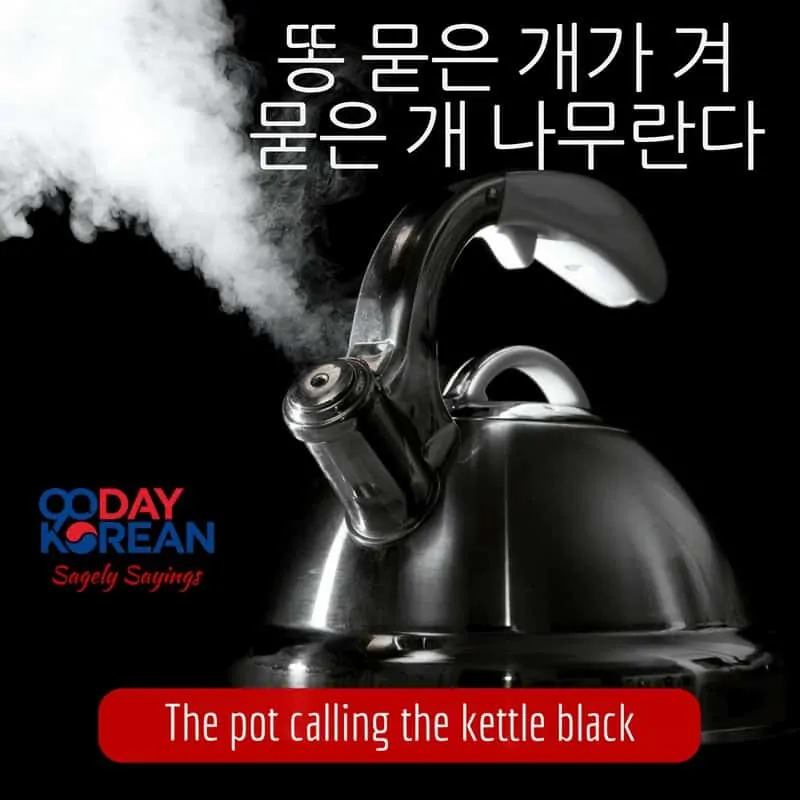











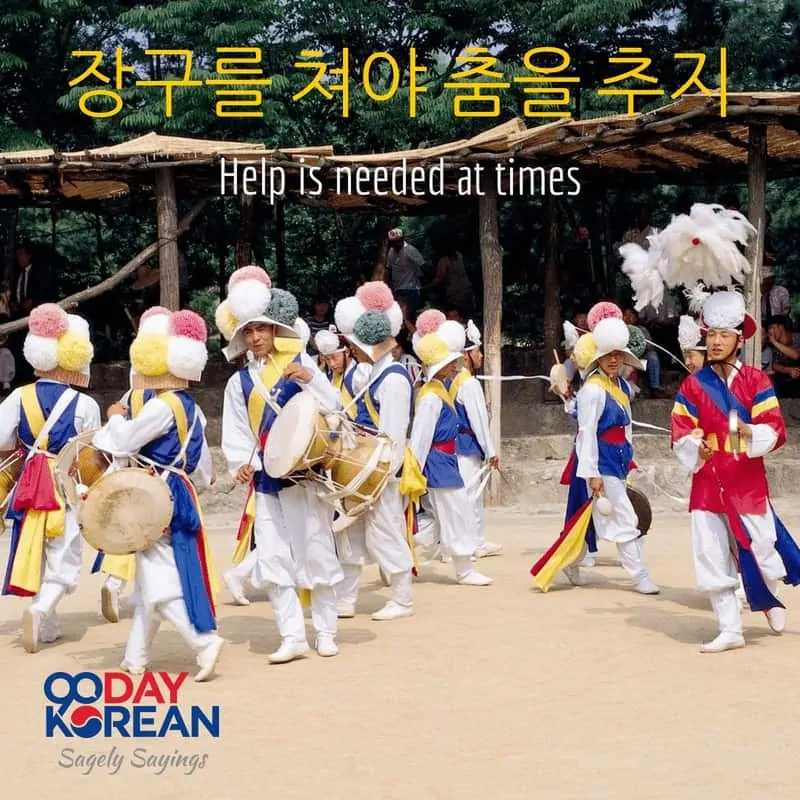


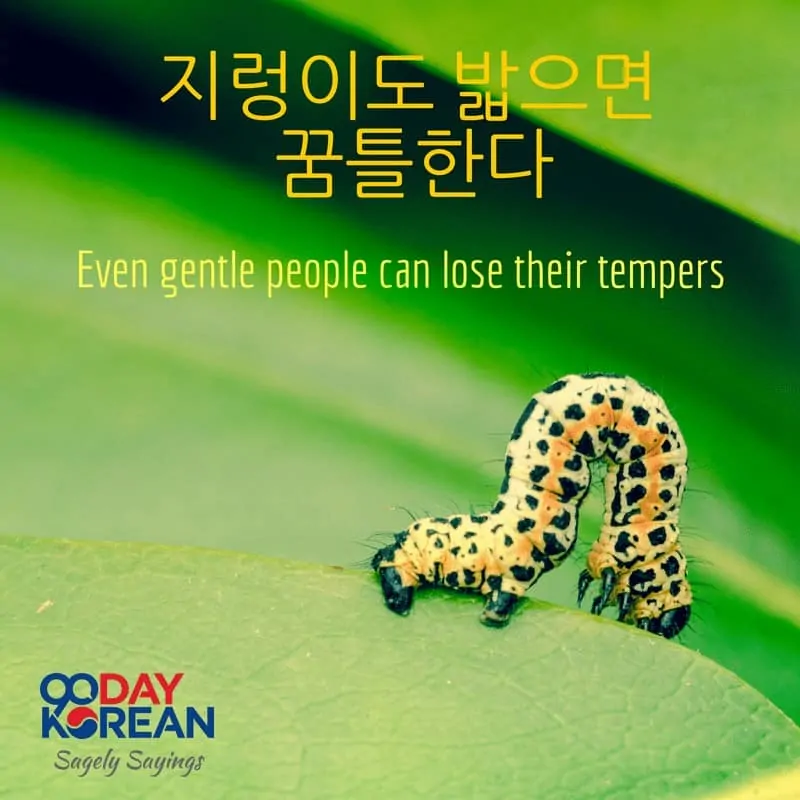
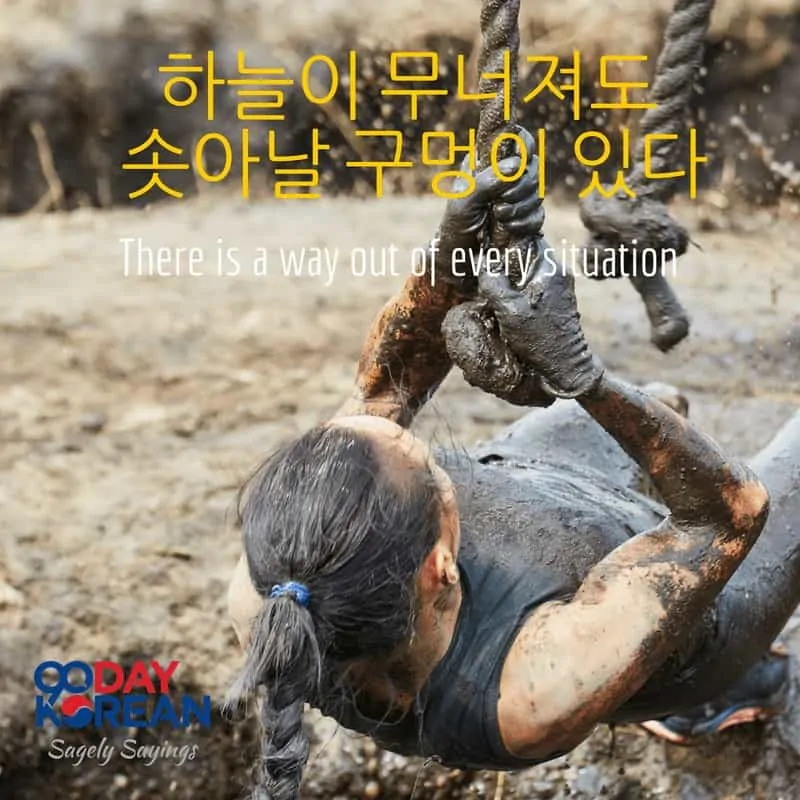

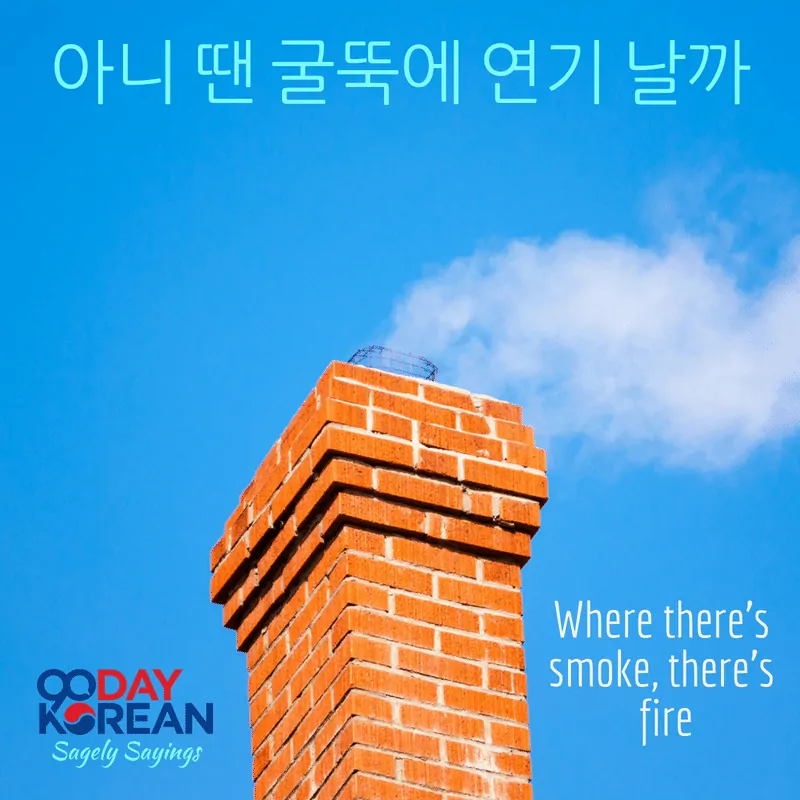



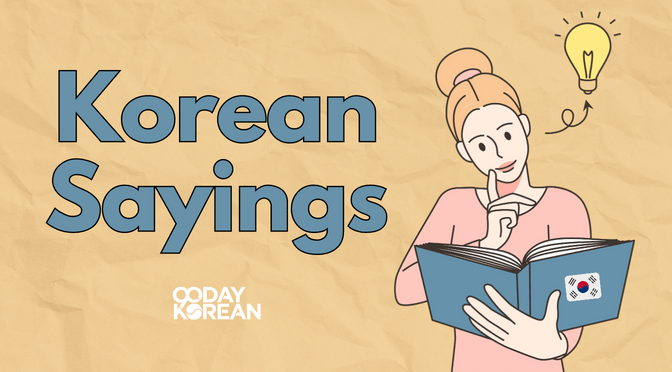

Thank you!
You’re welcome, Larry! ^^